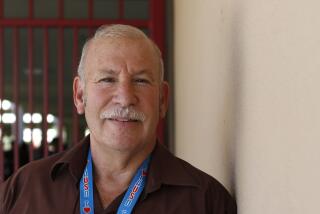Open Search Process
- Share via
When it comes to selecting a new president for Mission College, Kelly Candaele, president of the Los Angeles Community College District Board of Trustees, says the board is considering inviting the finalists to meet the public. That’s a good idea, judging by how well it worked at Cal State Northridge.
CSUN invited its four finalists for president to speak at forums open to any interested student, professor, administrator or community member. Audiences ranging from 70 to 100 people heard each candidate’s assessment of the job ahead and got to ask how each would handle specific challenges.
One of the challenges facing the new Mission College president will be earning the trust of those frustrated by the last attempt at naming a president. District trustees last year rejected all three finalists recommended by a campus and community search committee. Although the trustees have the ultimate say in the search, their action caused a rift that has not yet healed. An open and inclusive search process would go a long way toward healing that rift and bringing the community together around its new president.
And that would free the new president to tackle Mission College’s other challenges--which are considerable. But then, so is the college’s promise.
The newest and smallest of the San Fernando Valley’s three community colleges, Mission’s most immediate problem is space--or rather lack of space. Located in the burgeoning northeast Valley, it has the fastest-growing enrollment in the citywide district, an enrollment that is expected to double in five years.
Where will these new students go?
Failure to answer that question caused Mission’s last permanent president his job. He chose to retire last year after missed deadlines led to a forfeiture of state building funds. He’d been unable to find land for expansion.
Mission College abuts a county-owned regional park, but golfers, hang-gliders, baseball players and equestrians who use the park object to losing any space.
County Supervisor Zev Yaroslavsky agrees but envisions a shared parking structure for park users and students that would free up the college’s 5-acre parking lot for development. In the meantime, Mission’s interim president, Thomas Oliver, is using the state funds finally secured to squeeze a new laboratory and new classrooms onto the existing campus and would like to fund four similar projects. But critics complain about the “Manhattanization” of the campus.
The challenge for Mission College’s new president will be to build not only classrooms but consensus.
An inclusive approach would help bring the community together and free Mission College’s new president to tackle other challenges.
More to Read
Sign up for Essential California
The most important California stories and recommendations in your inbox every morning.
You may occasionally receive promotional content from the Los Angeles Times.













